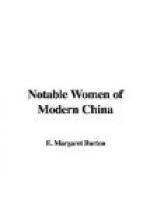She was finally persuaded to go to America for a period of change and rest. “Rest” for Dr. Kahn evidently means a change of work; for she went at once to Northwestern University to take the literary course which she felt would fit her for broader usefulness among her countrywomen. Eager to get back to China she did three years’ work in two, studying in the summer quarter at the University of Chicago, when Northwestern closed its doors for the vacation. In addition to her University studies, she undertook, for the sake of her loved country, a work which is peculiarly hard for her, and almost every Sunday found her at some church, telling of the present unprecedented opportunities in China.
The question may perhaps be raised as to whether days could be crowded so full and yet work be done thoroughly. But Prof. J. Scott Clark of Northwestern University said of her, at this time: “Dr. Kahn is one of the most accurate and effective students in a class of eighty-four members, most of them sophomores, although the class includes many seniors. The subject is the study of the style and diction of prominent prose authors, with some theme work. Last year Miss Kahn attained a very high rank in the study of the principles of good English style during the first semester, and in that of synonyms during the second semester. In the latter difficult subject she ranked among the very best students in a class of over three hundred members. She is very accurate, very earnest, and very quick to catch an idea. In fact she is nothing less than an inspiration to her classmates.”
In the spring of 1910 Dr. Kahn was a delegate to the Conference of the World’s Young Women’s Christian Association held in Berlin, and from there went to London for six months of study in the School of Tropical Diseases. She had planned to return to Northwestern University to complete the work interrupted by her trip to Europe, and to receive her degree. Her work had been of so unusually high a standard, however, that she was permitted to finish her course by correspondence, and was granted her degree in January, 1911. She completed her course in the School of Tropical Diseases with high honour, and in February, 1911, she reached Nanchang, where one of her fellow-workers declares, “she is magnificent from the officials’ houses to the mud huts.”
The new hospital was still in process of building, but the doctor began work at once in her old dispensary, and the news of her return soon spread. In a short time she was having an average of sixty patients a day, and several operations were booked some time before the hospital could be opened. It was ready for use in the autumn and in October Dr. Kahn wrote: “The work has gone on well, and patients have come to us even from distant cities clear on the other side of Poyang Lake. The new building is such a comfort. It looks nice and is really so well adapted for the work. I would be the happiest person possible if I did not have to worry about drug bills, etc.... It is impossible to drag any more money out of the poor people. Our rich patients are very small in number when compared with the poor. Yesterday I had to refuse medicines to several people, though my heart ached at having to do so. You see I had no idea that the work would develop so fast, and things have risen in prices very much the last few years.”




